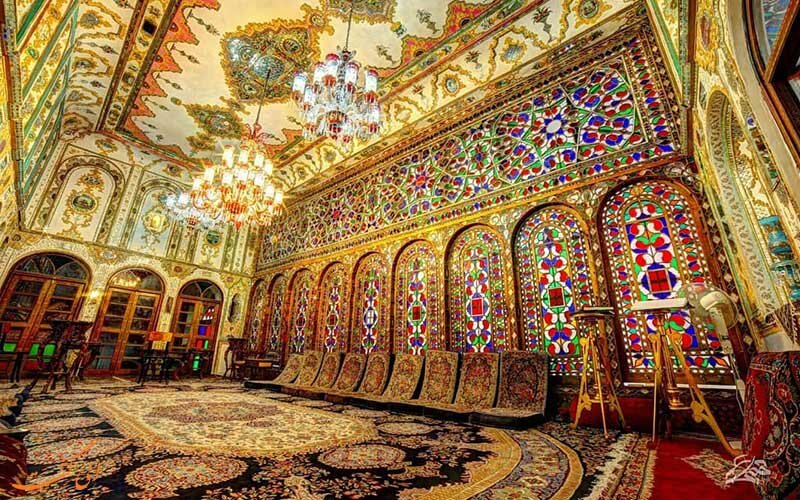Swiss traveler writes book to highlight ‘superb scene’ of boutique hotels in Iran

TEHRAN – Thomas Wegmann, who is a Swiss insurance professional, was so wowed by the hotel scene on his first visit to Iran in 2019 that, despite having no publishing experience, he decided to write a book.
“In Iran, there’s a superb scene of boutique hotels combining contemporary design with characteristic Persian heritage -- and it’s on the rise,” CNN quoted Wegmann as saying on June 7.
Some people travel to Iran for its history -- the 24 UNESCO World Heritage sites in the country, for starters. Others go for the living culture -- the great food and legendary day-to-day hospitality that regular travelers rave about.
Thomas Wegmann is a little different. For him, the most striking thing about Iran is its hotels. Not grand seven-star hotels, either, but small, boutique properties run by families -- while being absolutely cutting edge, the CNN wrote in an article.
“On the flight back from Tehran to Zurich, I was Googling whether there’s a book about hotels in Iran, and realized there isn’t a single one… I was so surprised by the country, and especially by the hotels.”
Below are excerpts from the CNN article written by Julia Buckley:
Now the result is out. “Persian Nights” showcases 16 of the best boutique hotels in the country, from cities such as Tehran and Shiraz to a village on Qeshm island, in the south of the country.
It is reportedly the first English-language book to be dedicated to the country’s hotel scene, giving those who don’t know the country a glimpse of the thriving design scene beyond the historical sites.
“I think for every country you travel to you realize you have some ideas which are quite different from reality, and if the country is a bit more closed, and fewer people are traveling there, sharing their photos and experiences, the more different it’s likely to get. And I think Iran is quite a closed country so there’s probably a bit more misconception than in other countries,” Wegmann says.
His book -- on which he worked with an Iranian team, from photographer Hamed Farhangi to designers Paulette Ghahremanian and Mehrdad MZadeh -- profiles 16 of the best hotels in the country.
“There’s such a strong heritage of old buildings -- why should they build new ones?” says Wegmann.
“This is a way of keeping them. I know owners who own others and are just waiting to renovate them.”
As well as hotels, the book has a section on guesthouses. Howzak House is Isfahan’s first ecolodge, near the UNESCO-listed Masjed-e Jame mosque. It’s run by young couple Babak and Nassim and, Wegmann says, “it’s like being part of their home.”
They even run textile-printing workshops and have bikes for guests. “You can just ride around, it’s very relaxed,” he says.
The hotels aren’t the only reason to go to Iran, though -- Wegmann says the country should be on everyone’s must-visit lists.
“It was one of a few countries that I’d been really interested in for a long time,” he says.
“Iran, Japan, Peru -- I love countries with a very strong and ancient culture that has relevance in history. And I’d met a few Iranians in Europe, and they were always very friendly.”
He made his first visit after separating from his wife. “It was my first trip afterwards, and I wanted to do something on my own,” he says.
“I expected a more traditional country but I was in espresso bars and concept stores in these hotels and it was like Europe or the States -- that came as a surprise to me,” he says. “I didn’t expect to see an Italian Marzocco coffee machine or a German Probat coffee roaster. And there’s a strong creative industry.
“I discovered there are lots of realities, and I wanted to show what I experienced. It’s what I saw and enjoyed.”
As a tourist, Wegmann says he felt “very free -- I felt like I could go everywhere, and was welcome everywhere at any time. I was going home late at night using Google Maps, and always felt safe.”
He was welcomed into mosques to admire the architecture, and enjoyed Iranian cuisine -- “they have fantastic slow-cooked stews, and a lot of vegetarian dishes -- it’s a very very rich culture in terms of eating,” he says.
With its history dating back 7,000 years, Iran is home to a large number of remarkable mansions and buildings. For better maintenance of such structures and extension of their contribution to the economy, tourism authorities have initiated a plan to cede the buildings to private owners so long as they are repurposed into traditional hotels, restaurants, and lodges.
Traditional houses mostly have their own spectacular architecture, many bedrooms, and an intimate atmosphere. This indeed is attracting an increasing number of investors who are putting their money into repurposing the time-honored buildings into boutique hotels.
AFM
